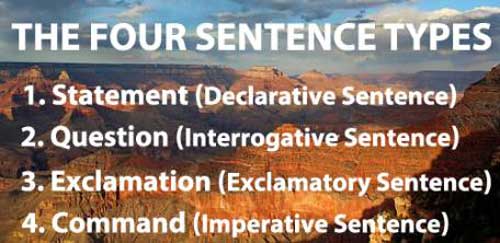
A sentence is the basic unit of language, a group of words, which expresses a complete thought. To complete a thought, a complete sentence must have a subject and a main Verb. A new sentence begins with a capital letter, ends with a punctuation, contains a subject that is only given once, a predicate and a verb or a verb phrase.
A sentence can be constructed with a single clause or several clauses.
When a sentence is a single Independent clause, it is called a simple sentence. Examples: The child was crying. / I am going to school. / He loves to play cricket.
With the addition of adjectives, adverbs, and prepositional phrases to a simple sentence does not change it into a complex sentence. For example: The little brown dog with white ear always barks loudly.
A sentence made up of two or more main clauses and joined by a coordinating conjunction, is a compound sentence. Example: I went to her place, but she was not there. / The sun was rising in the east and the moon was just setting.

A sentence containing a main clause and one or more subordinate clauses, introduced by a subordinating conjunction, is called a complex sentence. In the following examples, the main clause is shown in Italics: If you find any problem, you can always call me. / Her father shifted to London, when she was very young. / My mother likes dogs that don't bark.
People use different types of sentences for different purposes. In English, there are four types of sentence: Declarative, Interrogative, Imperative and Exclamatory. Generally, we use the declarative form to make a statement. The interrogative form is used to ask a question. We use the imperative form to issue a command, while the exclamatory form is used to make an exclamation.
Declarative sentences are statements and are most common type of sentence. They give us information and normally end with a full stop. They can be positive or negative. Examples: I like to drink coffee after dinner. / I do not like to drink coffee after dinner. / ‘Forrest Gump’ is my favourite movie. / He finished the book within a night.
When we want to know anything or want to ask a question, we use Interrogative sentences. In other words, Interrogative sentences always ask questions. They want to get information and always end with a question mark. Interrogative sentences can also be positive or negative. Examples: Do you like coffee after dinner? / Don’t you like coffee after dinner? / Why do you wait for his permission? / Why you didn’t wait for his permission?
Imperative sentences are meant for orders or commands. Usually, the subject of every single command is the same, which never stated in the sentence. The subject is ‘you’, which is understood. Imperative sentences can be positive or negative. Examples: Give him a cup of coffee. / Don’t give him coffee. / Show me your bag. / Don’t try to show me your red eyes.
When we exclaim, we use an Exclamatory Sentence. In other words, Exclamatory Sentences express any type of strong emotion and they always end with an exclamation mark. Examples: What a beautiful story! / How exciting game it was! / What a liar you are!